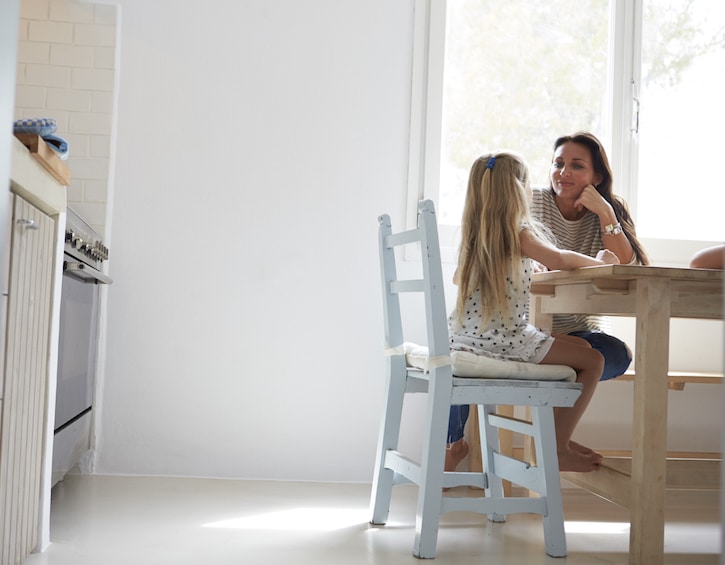
Sex education is part of growing up. But talking to your kids about sex can be a tricky matter. Here’s what I learned when I spoke to my girls about the birds and the bees.
When my girls were young, I had a few friends who were pregnant. My youngest, Aimee, was 3 years old, and Lily was 5. They both started asking me questions about where babies came from. I have always raised my kids with honesty because parenting experts say that if you lie to your kids, they will learn not to trust you and will then get their information from their friends or other dubious sources (and we all know other children aren’t the most knowledgeable people!). So when Lily said, “Mom, how do babies get made and where do they come from?”, and Aimee chimed in, “Yeah! How is Mrs Raymond’s baby getting out of her belly?”, I answered by saying, “You know what? Those are great questions. I want to give you a thoughtful answer, so I will come back to you on that.”
The reason I stalled is I wanted to do my homework. I wasn’t prepared for those questions and didn’t want to ruin a great opportunity for learning. After doing a lot of research, I found an amazing book especially for elementary school children called Changing You! A Guide To Body Changes And Sexuality by Gail Saltz. I chose it because it had illustrations that weren’t too scary, and I could read it with my girls without feeling too squeamish. Now, you may think 3 years old is a bit young to talk about the birds and the bees, but experts say when a child expresses interest in knowing, you shouldn’t ignore it.
“Depending on the child’s age, you can say that the baby grows from an egg in the mommy’s womb, pointing to your stomach, and comes out of a special place, called the vagina. There is no need to explain the act of lovemaking because very young kids will not understand the concept,” according to this article on KidsHealth.org.
“However, you can say that when a man and a woman love each other, they like to be close to one another. Tell them that the man’s sperm joins the woman’s egg and then the baby begins to grow. Most kids under the age of 6 will accept this answer. Age-appropriate books on the subject are also helpful. Answer the question in a straightforward manner, and you will probably find that your child is satisfied with just a little information at a time.”
When the book arrived, I used naptime as the chance to talk about it with them (yes, both my kids took naps until age 6 – I know, I was a bit of a sleep Nazi). We all snuggled together on the bed and I pulled out the book to read. I’m not going to lie, there were parts that were a little uncomfortable to see (drawings of a sperm and egg, and a naked father and mother). I kept monitoring my kids’ faces and said, “Shall I keep reading?” to which Aimee said, “Yep!” and Lily made a face and said, “Um, okay.”
I also used this time to talk to my kids about their own bodies. When I bought this book I also bought one called My Body Is Private, which explains that private parts are just that – private – and how to say, “No,” when something or someone makes you feel uncomfortable. It also focuses on safe and unsafe touching.
Read more: Keeping Kids Safe from Sexual Abuse: The Underwear Rule
A few days after I read the books to my girls, Lily asked my husband, Drew, “Did you really do those things with Mommy?”
Drew, who knew about the talk I had with them, said, “Yes.”
“Did you like it?” she asked.
“Enough to do it two times,” he answered.

Be warned: your kids won’t just talk to your spouse about sex; they’ll talk to others about it, too. The day after I read the book, Aimee came home from preschool and announced, “Mrs. Raymond’s baby is not coming out of her vagina.”
“Oh?” I asked, slightly horrified by what I was about to find out. “How do you know?”
“I asked her,” Aimee replied. (Let’s just say I had an interesting conversation with Mrs. Raymond, the assistant teacher, the following day.)
Here’s the thing: sex is a part of life. We all have sex. But it’s how you approach the subject that makes our impressions. Experts will tell you that the more taboo you make a subject the more exciting it can be to a child. Or, even worse, it may make the child feel shameful and embarrassed by it, which is not what we parents want.
“The ‘big talk’ is a thing of the past. Learning about sex should not occur in one all-or-nothing session,” say the experts at KidsHealth. “It should be more of an unfolding process, one in which kids learn, over time, what they need to know. Questions should be answered as they arise so that kids’ natural curiosity is satisfied as they mature.”
My kids are now 13 and 16, and sex has come up quite a few times since then. I have always wanted them to feel comfortable coming to me about anything, and I knew that if I were approachable about all subjects (especially drugs and alcohol and sex), and that I didn’t judge or shame them, they would come to me when they had questions. So far, that has absolutely been the case.
If your kids are asking you questions and you feel unsure how to answer, click here for an age-specific guide on how to talk to your kids about sex.






 View All
View All




 View All
View All









 View All
View All





